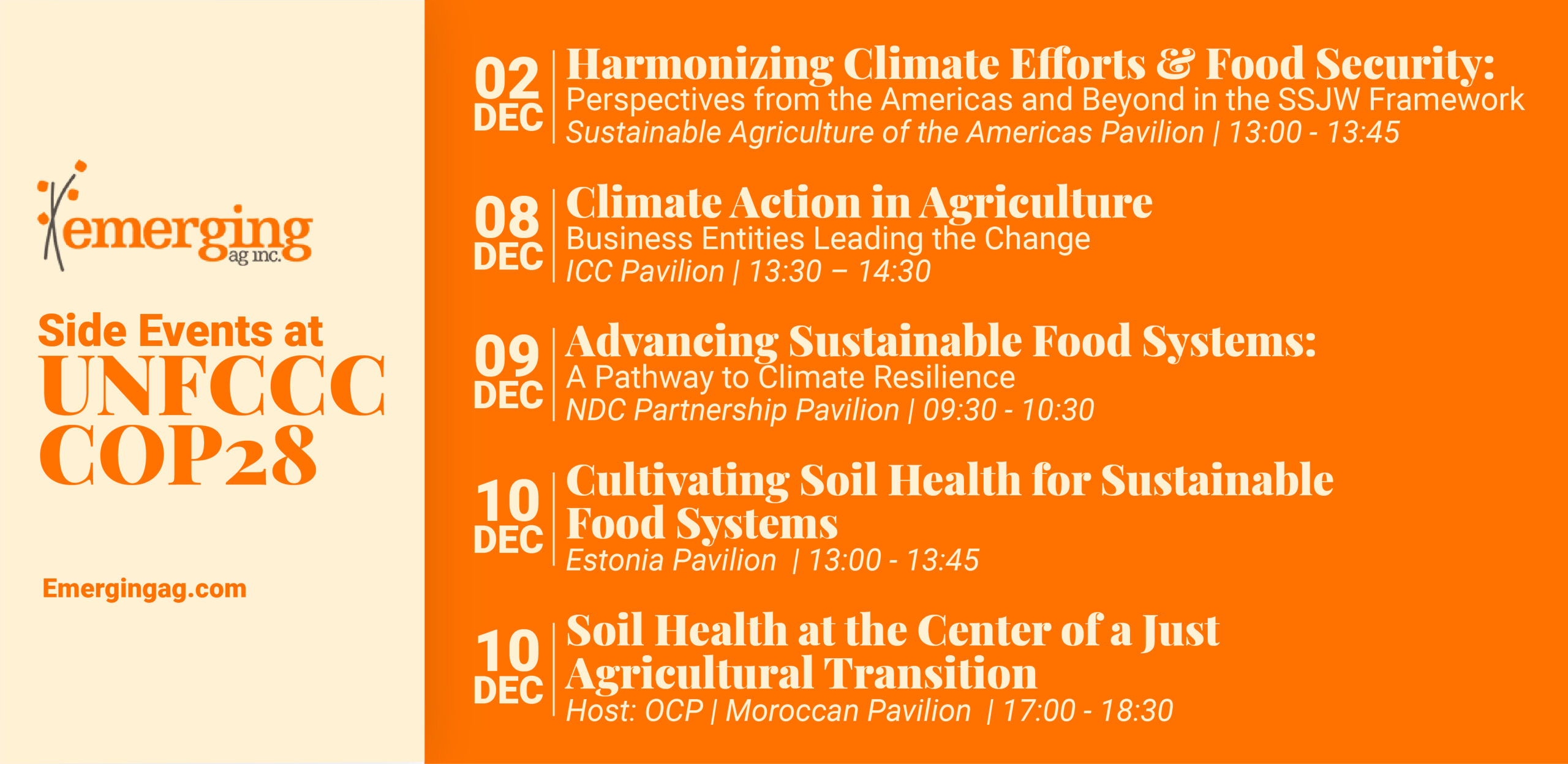ECOSOC at 80: Renewing Multilateralism in an Age of Global Uncertainty
On 23 January, the United Nations Economic and Social Council (ECOSOC) convened a commemorative session…
The 28th United Nations Climate Change conference (COP28), scheduled to convene from November 30 to December 12, 2023, in Dubai, United Arab Emirates (UAE), is a crucial milestone in our global response to the climate crisis. Partners from around the world recognize the pressing need for resolute action, and COP28 provides an unparalleled platform for nations, organizations, and experts to reaffirm their commitment to environmental sustainability. This summit represents an opportune moment for world leaders to set ambitious targets, explore innovative solutions, and engage in cross-border collaboration to confront the multifaceted challenges posed by climate change.

As Emerging ag, our active participation in COP28 underscores our dedication to sustainability, climate action, and the pursuit of a more environmentally resilient future. We are committed to facilitating substantive discussions, sharing groundbreaking solutions, and forging partnerships that address the urgent and complex issues posed by climate change.
We are thrilled to host a number of side events. These include:
Dec 2 – 17:00-18:00 | Sustainable Agriculture of the Americas Pavilion
The event delves into strategies that merge climate action with food security imperatives. Drawing from both global and national case studies, it underscores the advantages of sustainable agricultural practices in different sectors and the key role of innovation. Central to this discourse, the SSJW discussion acts as a catalyst, underscoring the transformative potential of partnerships to drive the implementation of impactful climate action.
Through convening a multifaceted panel of specialists, the event presents a comprehensive perspective that intertwines farmer leadership, food security imperatives, innovative solutions, institutional backing, and policy acumen. The dialogues aim to echo the essence of agricultural discussions within the UNFCCC framework, underlining the intrinsic link between robust climate action and ensuring food and nutrition security.
Dec 8 – 13:30-14:30 | ICC Pavilion
This event focuses on the vital role of business entities across various sectors of agriculture – including crop production, inputs, livestock, agroforestry, and food production-in contributing to a low-emission food system. It aims to provide a platform for these sectors to showcase their ongoing initiatives, the progress made, and the results achieved in climate action within agriculture. The event is designed to underscore the often-overlooked fact that agriculture is not only a contributor to climate change but also a critical part of the solution. By highlighting innovative practices and strategies being implemented across the agricultural sector, the event seeks to demonstrate how agriculture can significantly mitigate climate change impacts.
Furthermore, the event will highlight current gaps and challenges in achieving ultimate sustainability goals. Ultimately, there will be a significant emphasis on showcasing the critical role of businesswomen in guiding the transition to more sustainable food systems, featuring predominantly female speakers.
Dec 9 – 9:30-10:30 | NDC Partnership
Advancing sustainable food systems represents a crucial pathway to building climate resilience in our ever-changing world. These systems not only provide nourishment but are also key to mitigating climate change and adapting to its impacts.
As the world grapples with the dual challenges of climate change and food and nutrition security, the need for sustainable food systems has never been more pressing. Achieving sustainable food systems through Nationally Determined Contributions (NDC) targets requires a holistic approach that integrates food and agriculture into climate action plans, promotes sustainable practices, reduces emissions, and enhances resilience to climate change.
Achieving the Sustainable Development Goals (SDGs) will depend on the ability to innovate in a way that is broad, inclusive, and encompasses all of society. This requires a deep and bold transformation to produce food systems that are inclusive, resilient, sustainable, efficient, nutritious, and healthy. It calls for a diverse group of actors representing public, private, and social sector innovation partners in a commitment to make innovation a significant enabling factor for food systems transformation.
This interactive side event will bring together experts, policymakers, and stakeholders to explore innovative approaches and best practices in building climate-resilient food systems. The event is a collaboration of various stakeholders, including farmers, the private sector, civil society, and international organizations, to implement sustainable food system initiatives effectively. By embracing sustainable agricultural practices, conserving biodiversity, respecting indigenous knowledge, promoting healthier diets, empowering communities, and fostering global cooperation, we can create resilient food systems capable of withstanding the challenges posed by a warming planet.
Dec 10 – 13:00-13:45 | Estonia Pavilion
Representatives from the research, nutrients, and dairy sectors will showcase projects and practices dedicated to enhancing soil health and climate sustainability. This event delves into Estonian-led research initiatives that emphasize the recycling of bio-based and other raw materials into fertilizers, encapsulating the essence of a circular economy approach and business model innovation. It will be enriched with perspectives on effective nutrient utilization and the dairy sector’s soil management practices, all aimed at pioneering low-emission food systems. Moderated by a farmer, the true custodian of soil, the event promises diverse insights for concerted efforts being made in the domain of soil health.
This side event will explore the global significance of soil health for sustainable food systems, we will have an invited speaker from the EU Commission to shed light on specific initiatives in the EU context. Our panel of experts will discuss cutting-edge research, successful international case studies, and innovative practices from various parts of the world. The event aims to inspire global action and collaboration to address soil health challenges in the context of broader sustainability goals.
By highlighting Estonia’s and EU’s commitment to sustainable food systems (Farm to Fork strategy) and the contributions of EU member states (including Estonia) to the overall UNFCCC processes, particularly the Sharm El Sheikh Joint Work on the Implementation of Climate Action on Agriculture and Food Security. The event will also underline the EU’s dedication to achieving climate and sustainability goals while fostering international cooperation and knowledge sharing.
Dec 10 – 17:00-18:30 | Moroccan Pavilion
Hosted by OCP.